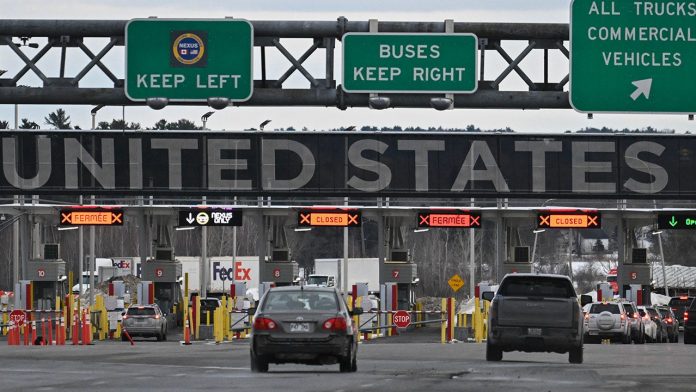The United States is making it mandatory for Canadians staying more than 30 days to register with authorities and have their fingerprints taken, as per a new interim final rule from the Department of Homeland Security (DHS).
This new requirement, effective from April 11, is applicable to all foreign nationals crossing the U.S.-Canada land border and are at least 14 years old, staying in the U.S. for 30 days or more.
The rule was submitted to the Federal Registrar on Wednesday amid an escalating trade war between the United States and Canada. Meanwhile, Canada announced $21 billion in new U.S. tariffs on the same day.
RUBIO PUSHES BACK AGAINST MAHMOUD KHALIL DEFENDERS: ‘NOT ABOUT FREE SPEECH’
Vehicles in line to cross into the United States at the Canada-U.S. border in St-Bernard-de-Lacolle, Quebec, Canada, on Thursday, March 6, 2025. (Graham Hughes/Bloomberg via Getty Images)
This change will impact some Canadians exempt from this requirement previously, including many Canadian snowbirds. The retirees now have to register with the government or risk fines.
The interim final rule clarifies that children under age 14 will not be fingerprinted, and biometrics will also be waived for Canadian business and tourist visitors entering by land, but they must still register if staying in the country for 30 days or more.
The rule acknowledges that the “affected population impacted by this rule are those who are currently unregistered and who would use the general registration form designated under this rule.”
“DHS estimates the affected population to be between 2.2 million and 3.2 million,” the rule states.
This file image shows a Guatemalan immigration agent fingerprinting a traveler during a secondary screening while being instructed by a U.S. Department of Homeland Security advisor on Aug. 26, 2019 in Guatemala City. (John Moore/Getty Images)
TRUMP THREATENS FURTHER TARIFFS ON CANADIAN STEEL, ALUMINUM, ELECTRICITY, VEHICLES
DHS and U.S. Citizenship and Immigration Services (USCIS) in February acknowledged their intention to follow President Donald Trump’s Inauguration Day executive order requiring all immigrants to register with the U.S. government.
The Jan. 20 executive order directs DHS to ensure all immigrants are registered under the Immigration and Nationality Act. That law, which has not previously been fully enforced, mandates that noncitizens over 14 years old must register and be fingerprinted within 30 days of entry, and that all registered noncitizens over 18 years old must carry proof of registration at all times.
Trucks cross the U.S.-Canada border along the Ambassador Bridge in Windsor, Ontario, on March 8, 2025. (GEOFF ROBINS/AFP via Getty Images)
“Once an alien has registered and appeared for fingerprinting (unless waived), DHS will issue evidence of registration, which aliens over the age of 18 must carry and keep in their personal possession at all times,” the February post to the USCIS website said. “Failure to comply may result in criminal and civil penalties, up to and including misdemeanor prosecution, the imposition of fines, and incarceration.”
“Many aliens in the United States have already registered, as required by law,” the post said. “However, a significant number of aliens present in the United States have had no direct way to register and meet their obligation under INA 262. USCIS has established a new form, G-325R, Biometric Information (Registration), and an online process by which unregistered aliens may register and comply with the law as required by the INA.”
CLICK HERE TO GET THE FOX NEWS APP
USCIS added, “Registration is not an immigration status, and registration documentation does not create an immigration status, establish employment authorization, or provide any other right or benefit under the INA or any other U.S. law.”




